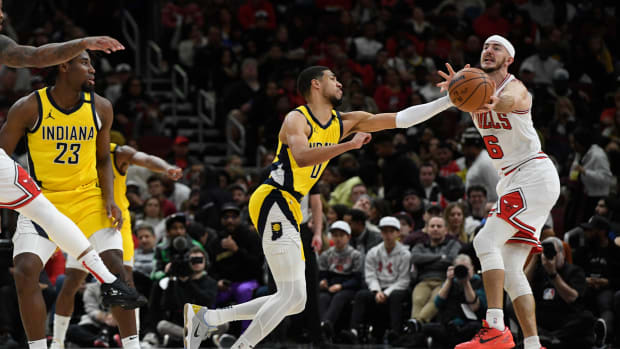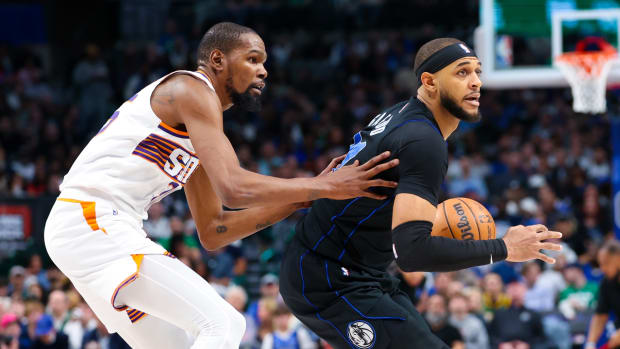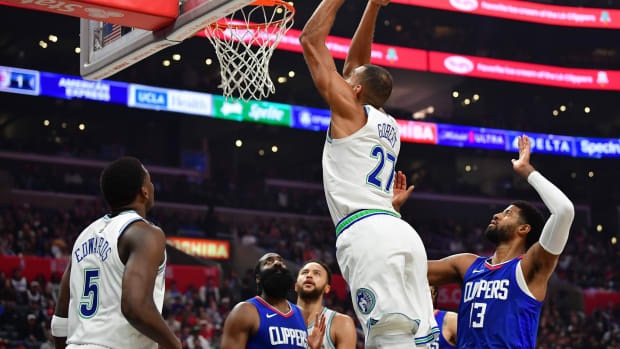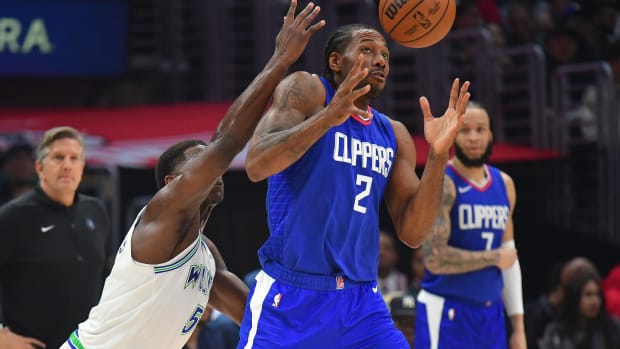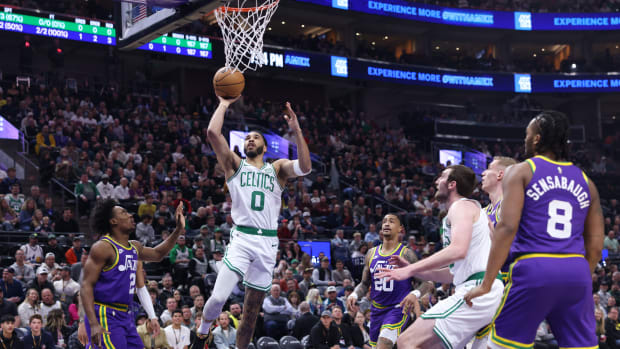Paolo Banchero Has Been a Revelation, Plus the Biggest Surprise Rookie
Here we are at midseason, and it’s time to take a glance at how some of the notable rookies have played. Here are some retrospective thoughts on the current class of NBA newcomers, their respective adjustments to the league and how it all adds up with my predraft assessments. This is very much not comprehensive—apologies if your favorite rookie didn’t get mentioned—but here’s what’s been on my mind so far this season.
What I missed about Paolo Banchero
Based on what we’ve seen so far this season, I think it’s fair to say the Magic nailed the No. 1 pick: Banchero has pretty clearly been the best rookie this season, averaging north of 20 points and flashing his versatility as an offensive focal point for Orlando. The Magic aren’t good yet, but they’re better than expected, and the Banchero–Franz Wagner tandem gives the organization some significant backbone to build around moving forward. Orlando can tailor versatile lineups around those two guys, who effectively combine skill, size and an all-around feel for scoring. Those are all relatively easy conclusions to draw at this point.
It’s been interesting to watch it unfold, as someone who had Banchero ranked second behind Jabari Smith Jr. (more on him in a second). I had Banchero first to start last season, changed my mind and ultimately don’t really feel that bad about it, with my concerns about Banchero all remaining somewhat relevant. He’s not super-efficient yet (in his defense, few rookies are), his three-point shooting is a work in progress and he’s not offering much on the defensive end in terms of blocks and steals. He also turns the ball over a lot, although that’s a byproduct of his minutes and usage, as well. Those are all pretty much things I expected, and areas he can improve on.
Ultimately, there’s a lot of time left for this to bear out. But I do think I undervalued Banchero’s ability to create shots and improvise, as well as what that allows him to do when coupled with the physical strength advantage he’s carried into the NBA. He’s a huge guy who’s always had a strong feel to play with others and also score the ball. I think I lost sight of some of the traits I loved about him early in his high school career and maybe nitpicked the shooting a little too much. (Banchero struggled immensely in last year’s ACC tournament, which gave me a lot of pause.) There aren’t a lot of guys in his mold, and the floor for his career even as an average shooter feels pretty significant, knowing what we know now.
Having said all that, it’s not like I ranked Banchero 10th or something. But all of this is to say that it looks like the Magic made a great decision atop the draft. Banchero’s ability to generate offense for himself and for teammates was what that roster needed. In hindsight, it’s a pick that maybe should have been easier to see coming than it was.
Jabari Smith Jr. is going to be fine
On the flip side of this discussion is Smith, who has thus far struggled to do the thing pretty much the entire NBA scouting community expected him to do for sure, which is make jump shots. I caught the Rockets in Chicago in December, and while Houston isn’t necessarily playing great basketball every night, the situation is probably less than ideal for Smith’s long-term development. Smith was the clear top prospect in last year’s draft to me, a stance that I may have taken a little too strongly—but I do think that it could eventually manifest long-term.
Without making excuses for Smith, I do think it’s fair to make the basic inference that he’s going to eventually be a really dangerous jump shooter in the NBA. It was more or less uniformly agreed upon that his shooting was likely to translate: His form is clean and consistent, and it’s very hard to block his shot considering his size and release point. I don’t think there was any illusion that Smith might not light the world on fire as a rookie—he’s still only 19 years old, adding strength and adjusting to the pace of play on a team that doesn’t really do much to feed him easy shooting opportunities. More creative deployment would do him some good. But regardless: If we assume Smith starts to make enough shots to keep defenses honest, it should open up a lot for him, giving him more space to put the ball on the floor, attack closeouts and diversify his own shot selection in a positive way. It’s worth noting that he’s been quite good around the rim as a rookie, which was viewed as a potential weakness by some.
I also think long-term, Smith will be one of the best defensive players in this class—he’s had to play center a lot in Houston, which isn’t his natural defensive spot, and has done pretty well considering the circumstances. He’s big, switchable and smart, which in itself goes a long way. Smith does need to be more consistent on that end, but the ability is very much there. The Rockets as a whole have some growth to do. But I’m not concerned about Smith, who fits a positional/role mold that’s both high-value and high-floor, and is still at an extremely early stage of development both physically and skill-wise (and still good at a lot of stuff!).
What happened to Johnny Davis?
Davis was the 10th pick in the draft, by the Wizards out of Wisconsin, and someone I was quite high on throughout the process last year. He’s also somewhat inarguably been the most disappointing of the 2022 lottery picks, having made just 10 NBA appearances and also not having set the world on fire in the G League. It’s far too early to write Davis off entirely, but we know enough to assert that it’s been a frustrating rookie season, and that expectations may have to be recalibrated.
I’ll admit to having been fully sold on Davis’s competitive makeup and intangibles as a player, which I do think matter to an extent and are part of why I think he eventually finds his way into an NBA role and settles in. However, I think that element of the eval is part of what caused me (and others around the NBA, presumably) to look at some of the holes in his game a little too lightly. Davis has never been a great improviser off the dribble, nor is he a top-flight three-point shooter, and he’s a bit undersized for a two-guard, which is something that can be significant for off-ball scorers in particular. Davis is extremely tough and competitive, which is what led to such an outstanding season at Wisconsin last year, but the lack of an elite athletic or skill-based strength has been part of why he hasn’t gotten a foothold on minutes yet.
I also think there’s probably a greater takeaway to be made here about the jump in level Davis faced, which I think has been more pronounced due largely to Wisconsin’s rigid, systematic offense. They win games playing that way—slowing the game down, moving the ball, finding cutters and turning the ball over to their best player at the end of the clock if nothing materializes—but ultimately, I don’t think it put Davis in a spot that built a ton of translatable shot-creating equity in the NBA. He wasn’t playing in ball screens, he wasn’t getting easy catch-and-shoot opportunities, and he was often forced to create from a standstill beyond the arc and barrel into the paint and midrange against crowds. The NBA game is vastly different, relying on quick improvisation and decision-making from guards a lot of the time, and based on what I caught in summer league and at the G League showcase in December, it feels to me like Davis came in a little bit behind the eight ball in those respects. I’m hopeful he puts things together and ultimately benefits from the adversity of this season, but I’ve also reframed my view of his long-term upside a bit. Davis profiles optimistically as a role player at this point, and Washington was presumably hoping for more when it selected him.
Watch NBA games live with fuboTV: Start a free trial today!
Walker Kessler: Good!
I saw Kessler play a ton at Auburn alongside Smith last season, and he’s already vastly eclipsed my expectations for him at this point in the year. As I’m writing this, he is shooting north of 70% from the floor and has twice as many blocks as any other rookie. On one hand, this makes sense, as he was a historically good college rim protector. But he was the third center off the board in the first round, going behind Jalen Duren and Mark Williams, who are better athletes but have been far less impactful as rookies. Never mind the fact that Kessler was immediately shipped from the Timberwolves to the Jazz as part of Minnesota’s Rudy Gobert acquisition, giving Utah an immediately useful replacement and strengthening the trade haul. He was the 22nd pick in the draft.
What did everyone miss about Kessler? It’s a bit puzzling in hindsight. The numbers were all there, in terms of evidence that his sheer size and timing would make a difference as a stay-at-home defensive big. I definitely don’t think the fact he got played off the floor in Auburn’s NCAA tournament loss to Miami helped—maybe there was some recency bias involved. I think there was on my end, as well—he kind of moved down my board as the year went on and I questioned his offensive functionality and athleticism a bit. His foot speed and ability to defend in space weren’t great. But playing in a conservative scheme, guys like Kessler—who have legitimately elite size and good feel for defending—still have a place in the league, pace and space aside.
All of that seems overwrought, as Kessler has been pretty outstanding and looks like a foundational piece of whatever the Jazz’s rebuild looks like. Statistically, by several different measures he’s already one of the best rim protectors in the league, not just among rookies. He’s arrived somewhat readymade. And right now, it’s gravy for Utah. Kessler plays a simple, effective style that may not have to change a whole lot moving forward.






























